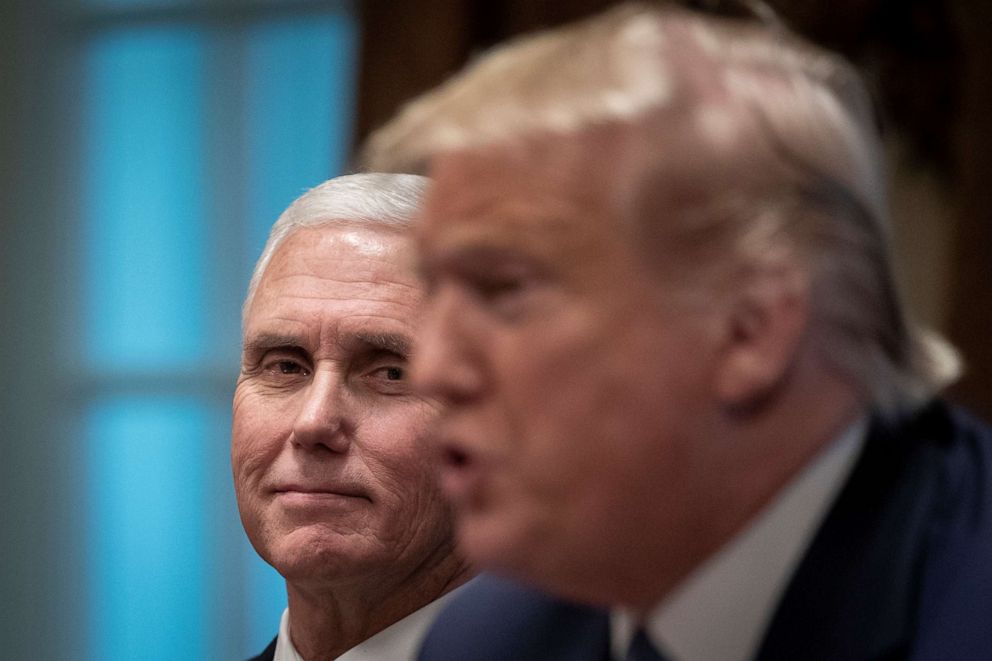Pence releases policy agenda for Republican Party, paving way for 2024 candidacy
The former vice president says his plan offers a "compelling choice."
Former Vice President Mike Pence announced Thursday a multi-pronged policy agenda for the Republican Party, the latest in a series of indicators he's planning to mount a run for the presidency in 2024.
Pence sees his "Freedom Agenda" as "focused on the future" and said it "offers a clear and compelling choice to the American people," according to a statement on his political advocacy group's website.
While he didn't say it outright, the timing suggests the choice he's referring to is between far-right conservative grievances over the 2020 election championed by former President Donald Trump and Pence's nod toward the future.
In a speech earlier this year, Pence forcibly broke from Trump, saying it was "wrong" for the former president to have pushed him to reject Electoral College votes for President Joe Biden. The pair have publicly grown apart since the Jan. 6 attack on the Capitol at which Trump supporters called for Pence's head, forcing him to hide in a secure location.
During a call with a handful of news outlets prior to the plan's release, Pence subtly highlighted the contrast with Trump.

"Elections are about the future, and frankly the opposition would love nothing more for conservatives to talk about the past or to talk of the mess they've made of the president," Pence told reporters, according to Politico. "And I think by relentlessly focusing on the future we can stop the radical left, we can turn this country around, we can win the Congress and statehouses back in 2022, and we can win back America in 2024 and beyond."
Pence's plan is organized into three pillars -- American opportunity, American leadership and American culture -- that strike largely at conservative cultural issues that helped rising stars like Virginia's Glenn Youngkin flip blue states red. Some of those agenda items include promoting "patriotic" education, a clear reference to critical-race-theory rhetoric in the classroom, which many Republicans oppose; protecting individuals from being "censored"; "protecting female athletic competition" by barring transgender women from playing in certain sporting events; honoring "God-given worth" by ending taxpayer funded abortion and abolishing Planned Parenthood.
Pence's plan calls for a version of election reform but doesn't mention the fallacy pushed by Trump and his allies that the 2020 election was "stolen." Nevertheless, Pence's agenda pushes for a voting system in which identification is required, in-person voting is preferred and encouraged and mail-in voting is "rare."
The Pence agenda also includes anti-Russian sentiments as the invasion of Ukraine barrels on, saying Putin "undermines freedom and democracy at home and abroad" while calling for the creation of private-sector led energy production centered around the export of American-produced natural gas that would cut Europe's dependency on Russian oil.
According to Pence's political group's website, the former vice president collaborated with several dozen prominent conservatives to create his plan, including former administration officials Kellyanne Conway, Betsy DeVos, and David Bernhardt. One notable contributor is outgoing Arizona Gov. Doug Ducey, a frequent target of Trump's harsh criticism, who drew ire from the former president for distancing himself from the Arizona audit of the 2020 election -- another indicator of the daylight between Trump and Pence.
Pence is now one of two high-profile Republicans who have released formalized policy proposals for the GOP as the party attempts to secure the advantage in the upcoming midterm elections. Florida Sen. Rick Scott, who chairs the National Republican Senatorial Committee, announced his controversial 11-point plan in February. Other rumored GOP 2024 candidates, including Sen. Tom Cotton, R-Ariz., have made public their priorities for the midterms and beyond.
Pence's advocacy organization, Advancing American Freedom, rolled out his plan with a video narrated by Pence, which closely resembles a campaign tease, Thursday morning.
"Our best days are yet to come," said Pence, "for renewing American culture, American opportunity, and American leadership, for a more perfect union for the people."




